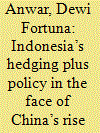| Srl | Item |
| 1 |
ID:
176241


|
|
|
| 2 |
ID:
176242


|
|
|
|
|
| Summary/Abstract |
Indonesia has taken a leadership role within the Association of Southeast Asian Nations (ASEAN) in drafting a common outlook on the Indo-Pacific concept. The widening of Indonesia's geostrategic canvas from the Asia–Pacific to the Indo-Pacific is in line with President Joko Widodo's intent to make Indonesia a Global Maritime Fulcrum (GMF). In view of the rivalry between the US and China and the emergence of various Indo-Pacific initiatives from other countries, Indonesia believes that ASEAN must try to maintain its centrality. The draft of Indonesia's perspective for an ASEAN outlook on the Indo-Pacific: towards a peaceful, prosperous, and inclusive region was submitted for considerations by ASEAN, and after 18 months of intensive lobbying by Indonesia the concept was finally adopted at the ASEAN Summit in June 2019. The ASEAN outlook promotes the principles of openness, inclusiveness, transparency, respect for international law and ASEAN centrality in the Indo-Pacific region. It proposes a building-block approach, seeking commonalities between existing regional initiatives in which ASEAN-led mechanisms will act as a fulcrum for both norm-setting and concrete cooperation. Rather than creating a new regional architecture, the East Asia Summit (EAS) is proposed as the platform for advancing the Indo-Pacific discourse and cooperation. Indonesia's ASEAN outlook on the Indo-Pacific marks its renewed foreign policy activism as a middle power and underlines the continuing importance that Indonesia places on ASEAN as the cornerstone of its foreign policy, emphasising ASEAN's centrality as the primary vehicle for managing relations with the major powers in the Indo-Pacific region.
|
|
|
|
|
|
|
|
|
|
|
|
|
|
|
|
| 3 |
ID:
190667


|
|
|
|
|
| Summary/Abstract |
Indonesia regards the shift in the center of economic gravity to Asia, marked by the rise of China and India following the earlier Asian tigers, as a welcome phenomenon that can benefit its own economic development. However, while celebrating the economic dynamism of the Indo-Pacific region, Indonesia also views with great concern China’s assertiveness in pursuing its claims over the whole of the South China Sea, as well as the re-emergence of major power rivalry, particularly between the United States and China as the incumbent and ascending superpower respectively, which can disrupt regional stability and prosperity. With its ‘free and active’ foreign policy doctrine Indonesia adheres to non-alignment, and as a matter of principle does not take sides in any great power competition. Indonesia’s policy in managing regional uncertainty which offers both opportunities for cooperation and threats of conflicts can best be described as hedging plus to ensure both its strategic autonomy and agency. It entails engaging all sides to maximize benefits while mitigating risks at both the national level and through ASEAN. At the same time, as the world’s largest archipelagic state straddling the Indian and the Pacific oceans, and the largest member of ASEAN, Indonesia carries out middle-power diplomacy by playing a leading role in promoting ASEAN-centric inclusive and cooperative wider East Asian multilateralism, helping to shape both the institutional and normative pillars of the International Order in the Indo-Pacific.
|
|
|
|
|
|
|
|
|
|
|
|
|
|
|
|